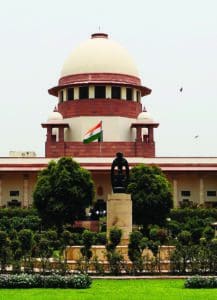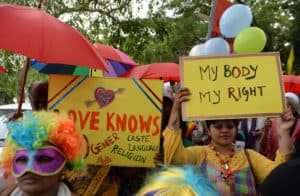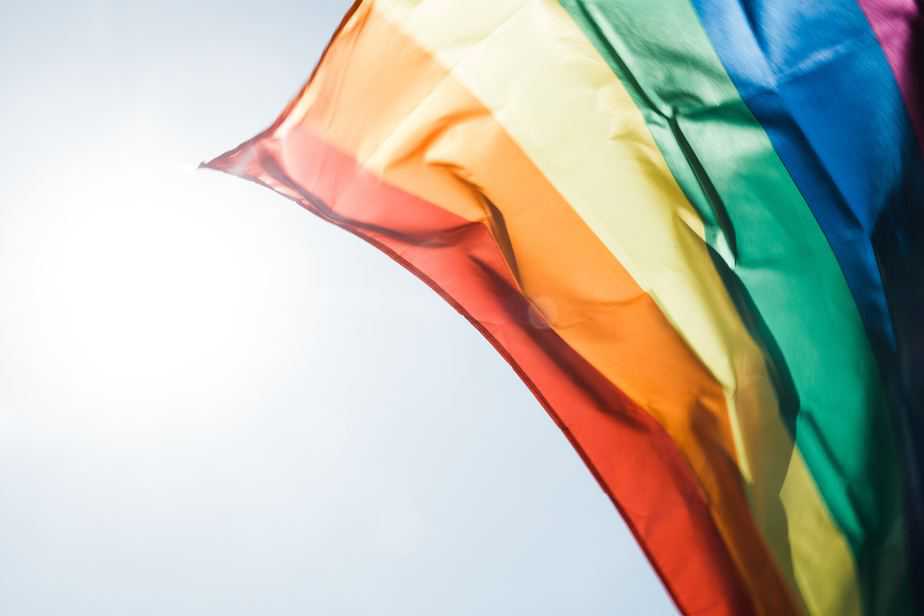A culmination to protracted legal and social struggle, homosexuality may be decriminalised as the Modi government has no objection and has left the matter to ‘the wisdom of the Supreme Court’
It goes to the credit of Narendra Modi government, of ‘Hindu Nationalist Party’ as described by the western media, to not object to decriminalising sex between two consenting adults irrespective of their gender or sexual orientation.
In a carefully drafted affidavit, the government left the decision on the ‘wisdom of the Supreme Court’. Additional Solicitor General Tushar Mehta while submitting the affidavit, told the five-judge constitution bench headed by the chief justice Dipak Misra and include justices R F Nariman, AM Khanwilkar, DY Chandrachud and Indu Malhotra, reaffirmed that the Centre has no objection with the court dealing with the validity and constitutionality of Section 377 of IPC.

There are six writ petitions and multiple interventions to water down Section 377 before the court. The six writ petitioners are Gautam Yadav of Humsafar Trust, Ritu Dalmia, owner of a restaurant chain Diva, Keshav Suri, executive director of The Lalit Suri Hospitality group, Urvi of IIT Mumbai, Arif Jafar of Lucknow based NGO Bharosa Trust and Akkai Padmashali, a transgender rights activist.
If the apex court decriminalises sex amongst consenting adults irrespective of the gender, which is likely to be the outcome given the tone and tenor of the proceedings in the court, India will be the first Asian nation to decriminalise homosexuality. Only 26 countries have decriminalised same-sex relationships so far: Australia, Netherland, USA, Belgium, Canada, Spain, South Africa, Norway, Sweden, Iceland, Portugal, Argentina, Denmark, Uruguay, New Zealand, France, Brazil, England, Scotland, Luxemberg , Finland, Ireland, Greenland, Columbia, Germany and Malta.
The protracted struggle:
The prime argument propounded so vociferously by two young lawyers, Menaka Guruswamy and Jayna Kothari, in the court is that Section 377 is violation of fundamental right to equality guaranteed by the constitution. It tantamount to ‘discrimination on the basis of gender’. And therefore has no place in a progressive and plural society.
It’s sad and ironical that personal relationship in a democratic society, even seventy years after the independence is governed by an archaic, colonial law, laced with Victorian morality.

Section 377 is not just counterintuitive, is farcical as well. It dates back to 1861 and is modelled on Britain’s medieval Buggery Act of 1533 that criminalises sexual activities “against the order of nature.” Section 377 is titled as ‘Unnatural offences’ and prohibits ‘carnal inter¬course against the order of nature with any man, woman or animal.’ This section for last nearly 160 years has not only criminalised homosexuality but also consensual heterosexual sexual acts like oral and anal sex in private, are all considered unnatural and therefore punishable. How many men or women have violated Section 377 of IPC?
Such discriminating law forces people, especially LGBTQ (lesbian, gay, bisexual, transgender and Queer), to lead a life in a shell, and deny them equal opportunity, not only in terms of leading a life according to their sexual orientation, but also at work place and other social spheres. They are discriminated against and stigmatised.
Earlier this week, Guruswamy, who also teaches at Columbia Law School, gave the example of petitioners Navtej Singh Johar and his partner Sunil Mehra who have been in a relationship for more than 24 years. Mehra was selected in civil services but didn’t join the government because he was apprehensive that his sexual orientation would be an impediment. Many were not bold like Mehra and spent their life in denial to be consistent with the legal framework prevalent in the country. “What do these examples tell us? That their lives have gone on in fear of persecution. These people… should be permitted to live their life in full… They are forced to live insecure, vulnerable lives,” said.
Public health concerns:
Not only that, spread of AIDS has a correlation with denial of legal legitimacy to same-sex relationship. For this reason, the Union Ministry of Health, for over a decade, has been supportive of decriminalisation of homosexuality.

The National AIDS Control Organisation (NACO) under the Minister for Health and Family Welfare Dr Anbumani Ramadoss filed affidavits with the Delhi High Court way back in 2006 arguing that criminalisation of homosexuality impeded the efforts to control HIV/AIDS. To the contrary, it was the Union Home Ministry under Shivraj Patil that prevented decriminalisation of homosexuality on ‘moral grounds’.
The two ministries were in an open tug-of-war, where ‘morality’ was in conflict with ‘reason’ and required intervention of the then Prime Minister Manmohan Singh. Even the Delhi High Court had condemned the government of the day for ‘relying on religious texts’ to justify criminality of homosexuality and had asked to come up with ‘scientific reports’ to substantiate their position. This points to the fact that moral policing is not the exclusive forte of the incumbent government.
In 2009, Delhi High Court passed the historic judgement decriminalising homosexuality for the first time in India. “We declare section 377 of Indian Penal Code in so far as it criminalises consensual sexual acts of adults in private is violative of Articles 21, 14, and 15 of the Constitution,” a Bench comprising Chief Justice A P Shah and Justice S Murlidhar stated. The seminal judgement quoted the first prime minister of India, Jawaharlal Nehru, ‘Words are magic things often enough, even the magic of words sometimes cannot convey magic of human spirit and of a nation’s passion …(this resolution seeks very feebly to tell the world of what we have thought or dreamt of so long, and what we now hope to achieve in near future)’. This became the template of LGBTQ movement in India.

Five years later, in December 2013, Supreme Court bench of justices GS Singhvi and SJ Mukhopadaya, overruled Delhi High Court verdict by upholding Section 377. “We hold that Section 377 does not suffer from… unconstitutionality and the declaration made by the Division Bench of the High Court is legally unsustainable.” It, however, qualified their decision by stating: “Notwithstanding this verdict, the competent legislature shall be free to consider the desirability and propriety of deleting Section 377 from the statute book or amend it …”
Right to privacy:
It was only in August 2017 that a nine-judge constitutional bench led by the then Chief Justice JS Khehar, examining the right to privacy, castigated their own 2014 judgement as pandering to a “majoritarian” view. Privacy, the bench concluded, is a constitutionally protected right that emerges primarily from the guarantee of life and personal liberty and from the other facets of freedom and dignity recognised and guaranteed by the fundamental right.
“The test of popular acceptance does not furnish a valid basis to disregard rights which are conferred with the sanctity of constitutional protection. Discrete and insular minorities face grave dangers of discrimination for the simple reason that their views, beliefs or way of life does not accord with the ‘mainstream’. Yet in a democratic Constitution founded on the rule of law, their rights are as sacred as those conferred on other citizens to protect their freedoms and liberties,” Justice Chandrachud had famously observed.

This judgement set the tone for what seems like end of criminalisation of homosexuality in the days to come, if the tone and tenor of the proceedings of the last few days at the apex court is taken into account. This week the bench lead by Justice Misra indicated rather unambiguously that the judgement will deal with the aspect of decriminalisation of homosexuality, and will not delve in the larger question of such as inheritance and the civil rights of people in same-sex relationships. “The question here is whether section 377 is ultra vires or not. Let us get out of this maze. We cannot now give an advance ruling on questions like inheritance to (same sex) live-in partners, whether they can marry, etc. Those are individual issues we cannot pre-judge now,” Misra observed.
Shifting paradigms:
This is no mean feat, is a culmination of decades of protracted battle. Kiran Bedi in 1991, then a superintendent of Tihar Jail, now the lieutenant governor of Pondicherry, refused to allow health workers to distribute condoms to male inmates. The NGO AIDS Bedhbhav Virodh Andolan (ABVA) filed a petition for the repeal of section 377, however, didn’t pursue that matter and was later dismissed.
It was Naz Foundation led by Anjali Gopalan that took the matter to the court in December 2001 and pursued it relentlessly in the years to come. That made a substantive difference and provide the necessary platform as the movement gained strength.
Perhaps, acceptance by religious leaders and puritans will take some time, but it’s time they are not allowed to rock the boat. To the amazement of many, the Rashtriya Swayamsevak Sangh (RSS) too has changed its views on homosexuality. In a paradigm shift to its earlier position, in March 2016, Dattatreya Hosbaleji, the Sah-Sarkaryavaha, or the joint general secretary of RSS, asserted consensual homosexual acts must be decriminalised.
The young face of RSS, Raghav Awasti, who’s also a practising lawyer in Supreme Court, objects to the fact, in an article recently published, that questions on homosexuality are routinely posed to those who support RSS, such questions are not posed often enough to Islamists and their apologists.
With tears welling the eyes of people of LGBTQ community and their supporters, they see light at the end of the tunnel and rainbow in the sky. Love is on the verge of getting unconditional legitimacy in India.





